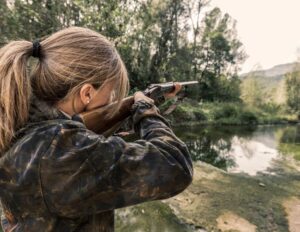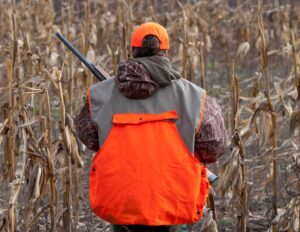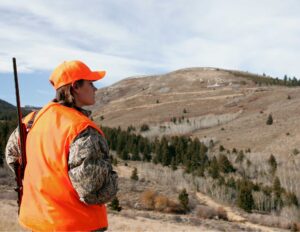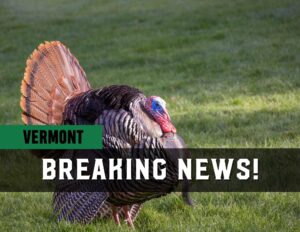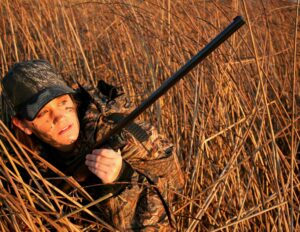Policy Corner Brief: MAY 2024

MORE THAN $37 MILLION IN CONSERVATION FUNDING PROTECTED IN NEBRASKA AS LEGISLATIVE SESSION CONCLUDES
ARTICLE CONTACT: JAKE GOULD
Why It Matters: The Nebraska legislative session saw its fair share of legislation that would ultimately have negative impacts on the Nebraska Game and Parks Commission funding. There were multiple bills aimed at offering free and discounted licenses and a bill to divert millions of dollars away from Nebraska Game and Parks Commission. Despite these efforts, the Congressional Sportsmen’s Foundation (CSF) remained active in opposing and offering proposed amendments to these bills to uphold the American System of Conservation Funding.
Highlights:
- The Congressional Sportsmen’s Foundation was active in Nebraska as multiple sportsmen-related bills were introduced throughout the session.
- Legislative Bill 826 (LB 826) and Legislative Bill 1036 (LB1036) were bills that aimed to offer free and discounted hunting and fishing licenses to resident and nonresident veterans.
- Legislative Bill 1413 (LB 141) would have redirected a total of $9.5 million in sportsmen-generated dollars away from the Nebraska Game and Parks Commission (NGPC).
On April 18, the short 60-day session came to an end in the Cornhusker State. There was no shortage of sporting bills introduced during the session and CSF was active in engaging on these by submitting written testimony to several legislative committees. Highlighted below are examples of CSF’s engagement to uphold the American System of Conservation Funding.
Legislative Bill 826: This piece of legislation would have removed the residency requirement which would have made nonresident veterans eligible to receive an annual combination fishing, fur-harvesting, and hunting permit at a discounted rate. CSF submitted testimony to the Natural Resources Committee highlighting the negative impact this would have on NGPC’s funding and encouraged amendments be made to the bill for reimbursement from the state general fund back to the NGPC. LB 826 did not make it out of the Natural Resources Committee.
Legislative Bill 1036: LB 1036 would have allowed for active-duty veterans who are Nebraska residents to receive a free annual combination fishing, fur-harvesting, and hunting permit. CSF submitted testimony to the Natural Resources Committee outlining the impact that no-cost licenses could have on the NGPC’s ability to fully claim their portion of revenue made available through the Pittman-Robertson and Dingell-Johnson Acts. LB 1036 also failed to make it out of committee. Legislation like LB 826 and LB 1036 are well intended pieces of legislation that carry unintended consequences that may negatively impact the NGPC and, as a result, the quality of opportunities available to sportsmen and women.
Legislative Bill 1413: This legislation looked to redirect $7 million from the Nebraska Game and Parks Commission state game fund and $2.5 million from the Nebraska Habitat Fund. CSF submitted testimony, and thanks in part to opposition from CSF and several partner conservation organizations, LB 1413 was amended to remove the redirection from state game fund and the habitat fund, ultimately protecting NGPC’s funding they rely on for their conservation efforts and allowing NGPC to remain eligible to receive their federal apportionments.
CSF was active in safeguarding the American System of Conservation Funding by offering amendments to reimburse NGPC from the state general fund for no-cost and discounted licenses and opposing legislation that would have redirected a total of $9.5 million in sportsmen-generated dollars. In 2023 alone, the NGPC received $27.4 million in federal apportionments. Through CSF’s efforts, over $37 million was protected and NGPC can continue their conservation efforts that benefit all Nebraskans.
States Involved: NE
UPDATE: MAINE LAWMAKERS PASS 72-HOUR WAIT PERIOD ON FIREARMS TRANSFERS
ARTICLE CONTACT: FRED BIRD
Why It Matters: Introduced on February 28, 2024, Maine Legislative Docket 2238 (LD 2238) An Act to Address Gun Violence in Maine by Requiring a Waiting Period for Certain Firearm Purchases, imposes a minimum three-day waiting period on the transferring of a firearm. On March 7, 2024, the Congressional Sportsmen’s Foundation (CSF) submitted testimony to the Committee on Judiciary, opposing the legislation and urging lawmakers to do the same. With the statutory adjournment of the Second Regular Session of the 131st Maine State Legislature on April 17, 2024, Governor’s Sportsmen’s Caucus (GSC) member, Governor Janet Mills, informed the legislature that there would be no special session called and the legislature was to complete their work within the prescribed timeframe. With that notice the legislature acted on many items to include LD 2238. Despite beating this effort back in the 2023 session, to CSF’s disappointment, LD 2238 narrowly passed out of both bodies along party lines in the final hours of the 2024 legislative session.
Highlights
- On February 28, 2024, Maine Legislative Docket 2238 (LD 2238), legislation that imposes a minimum three-day waiting period on the transferring of a firearm, was introduced in the Committee on Judiciary.
- Despite CSF’s opposition, on April 17, 2024, Maine LD 2238 narrowly passed out of both legislative bodies along party lines.
- The sportsmen’s community was the primary driver of critical legislation at both the state and federal levels to ensure the National Instant Criminal Background Check System (NICS) process is as effective as possible by incentivizing states to provide accurate and updated records of prohibited persons to the Federal Bureau of Investigation (FBI).
Introduced on February 28, 2024, and passed along party lines on April 17, 2024, Maine Legislative Docket 2238 (LD 2238) imposes a minimum three-day waiting period on the transferring of a firearm. Not only is the possession of firearms protected under the Second Amendment, but it is also engrained in our nation’s cultural fabric. Sportsmen and women in Maine have been at the forefront with offering improvements towards determining one’s eligibility in purchasing a firearm, but the three-day waiting period implemented by this bill is not a constructive route to take. Through implementing a delay in the transfer of a firearm, LD 2238 creates a uniquely biased hurdle on the hunting and sport shooting communities – a barrier levied on no other outdoor user experience if signed into law.
Maine’s sportsmen and women are the backbone of the funding structure for conservation efforts that benefit fish, wildlife, and their habitat throughout the state, as well as the citizenry at large. The proposed waiting period (now passed by both legislative bodies) will likely discourage the sale of firearms by lawful users, as sportsmen and women would be inconvenienced by having to make multiple trips to their dealer, unintentionally driving business to a neighboring state. Imposing a three-day minimum waiting period on the transferring of a firearm is a slight to the many benefits provided by the sporting industry to include recreational access to public and private lands, shooting ranges and boat access facilities, wetlands protection and its associated water filtration and flood retention functions, and improved soil and water conservation – all which benefit the public at large, not just sportsmen and women.
States Involved: ME
PENNSYLVANIA SEEKS TO REMOVE LONGSTANDING SUNDAY HUNTING RESTRICTIONS
ARTICLE CONTACT: KALEIGH LEAGER
Why It Matters: Sunday hunting bans are one of the last remaining examples of the puritanical and antiquated laws that were initially designed to encourage church attendance. At the time when blue law restrictions were first put in place, other activities that were illegal on a Sunday included opening a store for business, drinking alcoholic beverages, and tilling your fields. Access is a major limiting factor hindering participation in hunting, and restrictions on Sunday hunting provide a temporal-access barrier to youth and others that work or attend school throughout the week and are often involved in extra-curricular activities on Saturdays. Pennsylvania Legislators are looking to change this.
Highlights:
- Pennsylvania is one of ten states (CT, DE, ME, MD, MA, NC, NJ, PA, SC, and VA) that still have some type of Sunday hunting restrictions (2 prohibiting any Sunday hunting altogether).
- SB 67 (introduced by Sen. Dan Laughlin; previous Pennsylvania Legislative Sportsmen’s Caucus Co-Chair) seeks to remove the longstanding prohibition on Sunday hunting as well increase the penalties for trespassing on private lands, which includes hunting on private property without written permission.
- HB 2106 (introduced by Rep. Mandy Steele) also seeks to remove the longstanding prohibition on Sunday hunting as well as increase the penalties for trespassing on private lands, which includes hunting on private property without written permission.
- The Congressional Sportsmen’s Foundation (CSF) submitted a letter of support for SB 67 to the Senate and a letter of support for HB 2106 to the House Game and Fisheries Committee.
Currently in Pennsylvania, there are less than a handful of Sunday hunting opportunities for deer and bear, and some further opportunities for foxes, crows, and coyotes. However, State Senator Dan Laughlin and State Representative Mandy Steele are looking to increase opportunities for the sportsmen and women of the Commonwealth by introducing SB 67 and HB 2106, legislation that will ultimately remove the remaining, longstanding restrictions on Sunday hunting within the state. CSF recently submitted letters of support for SB 67 and HB 2106.
In the letters of support, CSF stated that “100% of the Pennsylvania Game Commission’s Budget is comprised of sportsmen and women generated dollars. In 2023 alone, the sale of hunting licenses contributed $41.9M in Pennsylvania, which in turn provided an additional $41.1M through the Pittman-Robertson Act, totaling around $83M in conservation dollars for the state.” The passage of such legislation is likely to assist in the increase of hunter participation, thus increasing conservation funding in the Keystone State. Additionally, CSF pointed to the major hindering factor that Sunday hunting prohibitions continue to create for youth and families that may be unable to hunt on Saturdays due to other extracurricular activities or work obligations.
The Pennsylvania State Legislature has previously acknowledged and acted upon the requests by hunters for Sunday hunting opportunities. For example, in 2019, the Pennsylvania Legislative Sportsmen’s Caucus spearheaded the passage of S 147 which was signed into law by former Governors Sportsmen’s Caucus Co-Chair Governor Tom Wolf. Current statute authorizes one day of deer hunting on Sundays during the archery season, one day of deer hunting during the firearm season, and one day left to the discretion of the Pennsylvania Game Commission (PGC) for species and season determined by them, which through subsequent rulemaking was selected to be bear hunting during the bear firearms season. Additionally, other select species such as foxes, crows, and coyotes may be hunted on Sundays in accordance with regulations adopted by the PGC. The hunting conservation community strongly supports the expansion of Sunday hunting opportunities in Pennsylvania to increase access and opportunity for sportsmen and women.
The passage of SB 67 or HB 2106 will grant the PGC full regulatory authority to set season dates and bag limits within the Commonwealth, including implementing Sunday hunting for many species of game animals. The PGC is in full support of the removal of the antiquated blue law barrier, and enactment of such legislation.
CSF looks forward to continuing to work with the Pennsylvania Legislative Sportsmen’s Caucus to encourage the passage of legislation that removes the centuries of Sunday hunting restrictions in Pennsylvania. Additionally, once enacted, CSF also looks forward to working with the PGC towards full implementation of Sunday hunting opportunities for the sportsmen and women of the Commonwealth.
States Involved: PA
COMMISSION RESTRUCTURING BILL GAINS MOMENTUM DURING KANSAS’ VETO SESSION
ARTICLE CONTACT: JAKE GOULD
Why It Matters: Throughout Kansas’ legislative session, several attempts were made to alter the current Kansas Wildlife and Parks Commission, including efforts to alter how commissioners are appointed as well as proposals to completely abolish the current Kansas Wildlife and Parks Commission. While these early attempts failed due to legislative deadlines, a final attempt was made to change the appointment process. During Kansas’ veto session a Conference Committee overhauled a bill originally regarding vehicle insurance and replaced it with the commission appointment language from Senate Bill 347, which failed earlier in the session.
Highlights:
- Senate Bill 347 (SB 347) was originally introduced as a bill that would have required all commissioner appointments made by the Governor to first require Senate approval.
- SB 347 was amended in the House to abolish the current Kansas Wildlife and Parks Commission, while also changing the Commissioner appointment process.
- Though SB 347 failed due to legislative deadlines, the Commission appointment portion of the bill resurfaced after House Bill 2530 (HB 2530) was overhauled in conference committee and the committee’s report was adopted by both chambers.
The Kansas legislative session adjourned in early April and reconvened for the start of their veto session on April 29. While many of the bills that the Congressional Sportsmen’s Foundation (CSF) was tracking failed due to legislative deadlines, an attempt to alter the Kansas Wildlife and Parks Commission’s appointment process resurfaced. During their veto session, a Conference Committee took HB 2530, a bill that originally dealt with vehicle insurance, completely removed the language of that bill, and inserted the commission appointment language from SB 347. However, this version did not include language that would have abolished the current Kansas Wildlife and Park Commission.
Many state game commissions, including the Kansas Wildlife and Parks Commission, were established with the purpose of protecting and conserving wildlife through regulations and sustainable hunting, fishing, and trapping. Members of these commissions should be experts in wildlife management, understand the significant contributions that hunters and anglers have on the conservation of fish and wildlife resources, and should be dedicated to protecting and advancing opportunities for sportsmen and women to participate in Kansas’ historical outdoor heritage. While each state has their own process for appointing members to their commission, CSF maintains that the knowledge outlined above be considered heavily, regardless of the entity charged with making commission appointments.
SB 347 ultimately failed due to the legislative deadlines, meaning that the current Kansas Wildlife and Parks Commission will not be abolished. However, the Conference Committee Report for HB 2530 was adopted by both the House and Senate so changes to the appointment process for commissioners are still on the table. From here, Governor Laura Kelly will have the final say as to whether these changes will actually take effect in Kansas.
States Involved: KS
CSF ACCESS AND STATE MANAGEMENT AUTHORITY PRIORITIES PASS U.S. HOUSE
ARTICLE CONTACT: TAYLOR SCHMITZ
Why It Matters: The passage of these bills marks the first time that either bill has passed its respective chamber. The Protecting Access for Hunters and Anglers Act will help maintain access for sportsmen and women by ensuring that federal agencies do not arbitrarily or haphazardly ban traditional ammunition and fishing tackle. The Trust the Science Act recognizes that gray wolves have been recovered across the country and rightfully restores their primary management to state fish and wildlife agencies.
Highlights:
- Last week, the U.S. House of Representative passed two priorities for the Congressional Sportsmen’s Foundation (CSF) on bipartisan votes.
- First, the House voted to pass H.R. 615, the Protecting Access for Hunters & Anglers Act, an important bill led by former Congressional Sportsmen’s Caucus (CSC) Leader and current CSC Member Rep. Rob Wittman, to protect the use of traditional ammunition and fishing tackle on certain federal lands unless a specific criteria is met.
- Additionally, the House passed H.R. 764, the Trust the Science Act, which will delist the gray wolf across the lower 48 states and return the management authority of these recovered species to state fish and wildlife agencies.
- Prior to the vote, CSF conducted direct outreach to many Members of the Congressional Sportsmen’s Caucus, including sending a House Caucus alert, to help secure a bipartisan floor vote.
Last Tuesday, the House of Representatives voted to pass the Protecting Access for Hunters and Anglers Act as well as the Trust the Science Act on a bipartisan vote.
The Protecting Access for Hunters and Anglers Act would prohibit the Secretaries of Agriculture and the Interior from banning the use of lead ammunition and fishing tackle on select federal lands and waters unless certain science-based triggers are met. The legislation does not remove the federal government’s ability to implement site-specific prohibitions on the use of traditional ammunition and fishing tackle, but rather establishes a criteria to be met. Specifically, the federal lands of focus include lands and waters managed by the U.S. Fish and Wildlife Service, the Bureau of Land Management, and the U.S. Forest Service.
H.R. 615 would require that any claims indicating a decline in fish and wildlife populations at a specific unit of land or water where lead ammunition and tackle is being restricted must be substantiated through field data from that unit. Secondly, any restrictions on the use of lead ammo and tackle must be consistent with the regulations of the impacted state fish and wildlife agency. Lastly, any restriction on the use of lead ammunition and tackle within the federal lands of focus must have the support of the respective state fish and wildlife agency.
The Trust the Science Act would reinstitute the 2020 rule to delist the gray wolf in the lower 48 from the threatened and endangered species list, which was vacated by a district court in 2022. Gray wolf populations continue to experience an endless circle of being scientifically delisted by the U.S. Fish and Wildlife Service only to be relisted by the courts for extraneous reasons. Unfortunately, the endless circle of scientific delisting and judicial reinstatement threatens to undermine the integrity of the Endangered Species Act. In states where wolves have been delisted, wolf populations continue to meet and exceed population goals. The opposition to delisting gray wolves is not rooted in science, but rather hangs on minor, extraneous challenges to delisting efforts that have no impact on the populations of wolves. This legislation would simply return the primary management authority of gray wolves to our state fish and wildlife agencies, but more importantly help harness this endless cycle of federal decisions and instant litigation.
The bills now head to the Senate for further consideration.
HOUSE AND SENATE AG COMMITTEE CHAIRS RELEASE INITIAL FARM BILL PLANS
ARTICLE CONTACT: KENT KEENE
Why It Matters: Last week, Chairman G.T. Thompson of the House Agriculture Committee released his framework for the next iteration of the Farm Bill while Chairwoman Debbie Stabenow of the Senate Committee on Agriculture, Nutrition, and Forestry released her version of the bill. Representing some of the most critical investments in conservation, particularly on private lands, in the world, the sporting-conservation community is working closely with Congressional leaders to advance the interests of sportsmen and women in the next iteration of this legislation.
Highlights
- Last week, the Chairs of the House and Senate Agriculture Committees released their plans for the next iteration of the Farm Bill with the Senate Committee’s majority releasing actual legislation and House publishing a framework.
- Because each chamber is controlled by different political parties, there are understandably differences between their plans which likely represent starting points for future Farm Bill negotiations.
- Fortunately for sportsmen and women, each version contains several priorities identified by the sporting-conservation community, breeding an optimistic outlook as the Farm Bill conversation continues.
As Congress continues its work on behalf of the American people, majority party leadership from the House Agriculture Committee released their framework for the next Farm Bill while majority leadership from the Senate Committee on Agriculture, Nutrition, and Forestry released actual bill text. These moves represent an important step toward reauthorization after the 2018 Farm Bill expired last year before receiving a one-year extension. While the overall Farm Bill covers many aspects that are important to Americans, sportsmen and women naturally focus in on the plans laid out for the Farm Bill’s Conservation and Forestry Titles.
The Congressional Sportsmen’s Foundation (CSF) has worked closely with Congressional leaders to advocate for robust investments in and improvements to the Conservation and Forestry Titles. After reviewing each document released last week, CSF is largely optimistic that many of our priorities, which benefit fish, wildlife, and opportunities for sportsmen and women will be included in the next Farm Bill.
While there are consistencies between the plans put forth by each Committee’s leadership, it is important to recognize that these versions still differ in several areas that are of high importance for many members of Congress, particularly as they relate to aspects outside of the Conservation and Forestry Titles. Because of this, there is still much work to be done as it relates to the Farm Bill, but all sides have indicated an interest in advancing legislation that has strong bipartisan support. CSF will continue to advocate for the interests of sportsmen and women in this critical piece of legislation.
PRO-SPORTSMEN LEGISLATION ON THE MOVE IN LOUISIANA
ARTICLE CONTACT: MARK LANCE
Why It Matters: Our four-legged canine companions can play a crucial role in many aspects of our sporting traditions, including in the tracking and recovery of wounded game. Exhausting all available resources when tracking and recovering game is one of the cornerstones of hunting that ethical sportsmen and women share, so the use of tracking dogs is an important tool for many sportsmen and women. Additionally, ensuring that hunters, anglers, and trappers are protected from harassment on all state-managed properties open to hunting and fishing will help ensure that Louisiana’s sportsmen and women can continue to pursue their pastimes.
Highlights:
- HB 409, authored by Louisiana Legislative Caucus (Caucus) Member Gabe Firment, extends the prohibition on the harassment and disturbance of trappers, hunters, and fishermen to all lands and waters managed by the state.
- HB 802, authored by Caucus Member Representative Jason Dewitt, authorizes the use of dogs to retrieve and dispatch mortally wounded deer with the use of lights except on wildlife management areas (WMAs).
- Both pieces of legislation passed the House of House of Representatives unanimously and were reported favorably out of the Senate Committee on Natural Resources.
For most sportsmen and women, they only have a couple of days out of the week to engage in their outdoor pursuits and many are limited to lands and waters open to the public. No one wants to be harassed while trying to enjoy their outdoor pastimes. Ensuring that hunters, anglers, and trappers are protected from harassment on all state lands and waters while engaged in their pursuits will help protect sporting traditions for future generations. This is important as sportsmen and women in Louisiana contribute over $40 million per year through the “user pays – public benefits” structure of the American System of Conservation Funding.
In Louisiana, hunters cannot currently utilize tracking dogs or possess a firearm while tracking wounded deer after legal shooting hours. Aside from WMAs, HB 802 allows for the use of tracking dogs after legal shooting hours, allows for the use of lights while tracking wounded deer, allows hunters to dispatch wounded deer even after legal shooting hours, and allows licensed hunters and trackers to enter onto other private property so long as they have written permission from the landowner. The Louisiana Department of Wildlife Resources testified in support of the bill before the Senate Natural Resources Committee. Allowing these practices to take place assists hunters in making every effort to retrieve their game so that they not only do right by the animal but also increase their chances of putting food on the table for their families.
HB 409 and HB 802 now await debate on the Senate floor. The Congressional Sportsmen’s Foundation (CSF) will continue to coordinate with the Caucus to support these important pieces of legislation for sportsmen and women in the “Sportsman’s Paradise.”
States Involved: LA
SCIENCE-BASED FISH AND WILDLIFE MANAGEMENT PROTECTED IN VERMONT, FOR NOW
ARTICLE CONTACT: FRED BIRD
Why It Matters: Introduced on January 12, 2024, Vermont Senate Bill 258 (S. 258) – An act relating to the management of Fish and Wildlife – proposed to transfer the authority to adopt rules for the taking of fish, wildlife, and fur-bearing animals from the Fish and Wildlife Board to the Department of Fish and Wildlife. The bill recently passed the Senate and moved to the House where it (for now) has met its demise. Though there is a chance of the bill resurfacing during the June veto session, it is unlikely S. 258 will be resuscitated. At this point it appears our efforts delivered and have provided reason for great optimism for S. 258’s final demise.
Highlights:
- On May 10, 2024, S. 258 failed to move along in the legislative process in the Vermont legislature and, for all intents and purposes, is dead.
- In recent weeks, S. 258 had gone through many changes including the makeup of the Board from 14 to 15 members with one At Large member.
- The bill would have allowed for and demanded “balanced viewpoints” which would have opened seats to individuals who are philosophically opposed to hunting, angling, and/or trapping a seat on the Board.
- 258 maintained its call for the VT Fish and Wildlife Board to be an Advisory Board, only.
- Finally, a complete ban on coyote hunting with bait or dogs (previously stand-alone legislation in prior sessions) was also included in S. 258.
Introduced on January 12, 2024, Vermont Senate Bill 258 (S. 258) – An act relating to the management of Fish and Wildlife – proposed the transfer the authority to adopt rules for the taking of fish, wildlife, and fur-bearing animals from the Fish and Wildlife Board to the Department of Fish and Wildlife. Even after S. 258 went though many amendments, it remained a significant threat to wildlife management and the sporting community in the Green Mountain state. The bill did nothing to address most of the major shortcomings of the original version, such as the rule making and season setting authority from the Board to the Department, allowing for anti-hunting, trapping and angling Board members, and to ban the hunting of coyotes with the aid of hounds and bait.
The Vermont Legislative Sportsmen’s Caucus, with Congressional Sportsmen’s Foundation’s (CSF) support, hosted a reception earlier this year that featured S. 258 prominently with several speakers from various organizations as well as the Vermont Fish and Wildlife Commissioner, educating elected officials on the pitfalls with the bill. CSF also spearheaded an action alert with a wide range of conservation partners. CSF asked sportsmen and women in Vermont to encourage their elected officials to oppose S. 258 which resulted in thousands of letters from concerned Vermonters being sent to their elected officials. Though the immediate threat of S. 258 appears to have been put to rest for now, the strategy of attacking state fish and game boards or commissions has quickly become a perennial issue, and the Vermont Fish & Wildlife Department’s Board will likely be the focus of scrutiny from non-sporting and anti-hunting influences in the future. As previously reported, having a Board with members that are neutral on matters or even directly opposed to hunting, trapping, and fishing leads to obstructionism which, in turn, will potentially restrict access and opportunity for sportsmen and women. The pressure for “non-consumptive” representation on game commissions directly threatens the future of conservation in Vermont and in numerous other states where this issue has popped up in recent years.
The Congressional Sportsmen’s Foundation continues to work with the Vermont Legislative Sportsmen’s Caucus to staunchly oppose future misguided legislation and remains committed to thwarting efforts to subvert the mission and success of the Vermont Fish and Wildlife Board. CSF thanks its partners and the sporting community for rallying to our ACTION ALERT to ensure Vermonter’s voices were heard in Montpelier. CSF will remain keenly attentive throughout the coming weeks and engage aggressively, should there be an attempt to breathe life back into this, rightfully dead, legislation.
States Involved: VT
SENATE UNANIMOUSLY PASSES SIGNIFICANT CSF PRIORITY, ACE REAUTHORIZATION ACT
May 09, 2024 (Washington, D.C.) – Yesterday, the United States Senate unanimously passed the America’s Conservation Enhancement (ACE) Reauthorization Act (S. 3791), a comprehensive and bipartisan bill that is a top priority for the Congressional Sportsmen’s Foundation (CSF). This important legislation is led by Congressional Sportsmen’s Caucus (CSC) Member and Chair of the Senate Environment and Public Works (EPW) Committee Sen. Carper, EPW Ranking Member and CSC Member Sen. Capito, who are joined by CSC Co-Chair Sen. Boozman, CSC members Senators Mullin and Wicker among other bipartisan cosponsors.
The ACE Reauthorization Act seeks to reauthorize nearly a dozen provisions that will bolster the conservation of fish, wildlife, and their associated habitats across North America and provides an important protection for America’s anglers. This legislation has been a top priority of CSF since the ACE Act was first signed into law in 2020. Leading up to the Committee passage, CSF worked to secure bipartisan cosponsors to the ACE Reauthorization Act to demonstrate the wide-spread support for this legislation. CSF also worked to secure modifications to the National Fish Habitat Conservation Through Partnerships (NFHP) language in order to improve the program’s efficiency and ability to drive limited dollars to where they are needed most. The unanimous passage of S. 3791 continues to demonstrate that conservation and other sporting-conservation priorities continues to be an area of strong bipartisan agreement.
“At a time when Congress appears to be extremely divided, we continue to see that issues of importance to sportsmen and women remain an area of strong bipartisan support,” said CSF President and CEO Jeff Crane. “The unanimous Senate passage of the ACE Reauthorization Act is a clear result of the bipartisan efforts of CSC Members Chairman Carper, Ranking Member Capito, and the other leaders of this legislation to deliver wins for sportsmen and women across the nation.”
Specifically, the ACE Reauthorization Act includes important programs such as the North American Wetlands Conservation Act (NAWCA), which provides strategic investments to conserving and restoring degraded wetlands across North America. Since its inception 35 years ago, NAWCA has provided over $2.1 billion in federal grants that has leveraged nearly $4.3 billion in non-federal contributions. In total, there have been over 3,300 NAWCA projects that have contributed to the conservation of nearly 32 million acres of wetlands in the United States, Mexico, and Canada. Unfortunately, America has lost roughly 50% of its wetlands. If passed, the ACE Reauthorization Act will increase the NAWCA authorization level from $60 million annually to $65 million annually to address the declines in wetlands.
Additionally, this legislation reauthorizes NFHP and increases the funding level from $7.2 million to $10 million annually. NFHP is a state and locally driven collection of partnerships that work to conserve priority aquatic habitat, restore fish populations, and enhance recreational fishing opportunities. CSF’s Senior Director, Fisheries Policy, was recently reappointed to serve on the Congressionally authorized NFHP Board that offers guidance for the partnerships and helps direct funding for on-the-ground projects.
Furthermore, the ACE Reauthorization Act will provide a 5-year protection to prohibit the Environmental Protection Agency (EPA) from regulating the use of lead fishing tackle under the purview of the Toxic Substances Control Act (TSCA). The EPA has consistently reaffirmed state management authority of lead fishing tackle and this legislation will ensure the EPA cannot be petitioned to regulate lead tackle under TSCA for a period of 5 years.
CSF extends our gratitude to CSC Members Chairman Carper, Ranking Member Capito and the other bipartisan leaders of this legislation. We look forward to working with the House to get this legislation across the finish line.
PENNSYLVANIA POISED TO BECOME 32ND STATE TO ISSUE DISCOUNTED HUNTING AND FISHING LICENSES TO COLLEGE STUDENTS
Why It Matters: College can be an incredibly challenging time financially for many students, which presents a real barrier for them purchasing a hunting, trapping, or fishing license while in school. If young adults cease their participation in hunting and angling for 4 years while other interests are blossoming, there is real potential for them to stop participating all together. Senate Bill 344 (SB 344) seeks to address this issue and safeguard our collective outdoor heritage by allowing non-resident college and university students, who are attending a college within the Keystone State, to purchase hunting and trapping fees at the same rate as Pennsylvania Residents – thereby encouraging ongoing participation in our beloved pastimes.
Highlights:
- PA SB 344 is sponsored by Senator Chris Gebhard and is Co-Sponsored by Pennysylvania’s Sportsmen’s Legislative Caucus Co-Chairs Sen. Greg Rothman, Sen. Jim Brewster, and former Caucus Co-Chair, Sen. Dan Laughlin.
- On June 27th, 2023, SB 344 passed the Senate unanimously and was referred to the House Game & Fisheries Committee but has yet to receive a hearing date.
- Shortly thereafter, the Congressional Sportsmen’s Foundation (CSF) encouraged the House Game and Fisheries Committee to schedule a hearing for SB 344, via letter of support, so the bill can continue through the legislative process.
Several states have adopted legislation that allows non-resident, full time college students to obtain hunting and/or fishing licenses at the same price as in-state residents. These measures are intended to maintain access to, and encourage participation in, hunting and angling for student-sportsmen who due to the financial constrains faced by many students, may otherwise not be able to afford. With the complete passage of SB 344, Pennsylvania will be the 32nd state that has implemented legislation allowing non-resident hunting and/or fishing licenses at the same price residents pay. The states that currently have this program in place are, AL, AR, CO, GA, IA, KS, KY, LA, ME, MD, MI, MS, MO, MT, NH, NY, NC, ND, NV, NE, NM, OH, SC, SD, TN, UT, VT, VA, WV, WI, and WY.
As one of CSF’s proactive policy focal areas, we are committed to ensuring that student-sportsmen remain engaged in our outdoors traditions while in school. Without college student licenses and other related programs, we risk disengaging the future generations of hunters, anglers, and trappers. Additionally, CSF looks forward to continuing to work with the Pennsylvania Legislative Sportsmen’s Caucus to move the bill through the House Committee and ultimately to the floor for final passage.
States Involved: PA
SHARE ON
You may also like
The role corn plays for gamebirds and economies ac...
Sportsmen’s conservation policy issues from publ...
Sportsmen’s conservation policy issues from publ...






